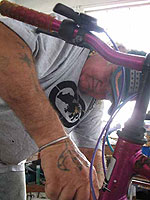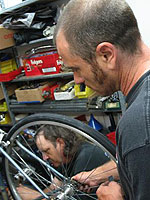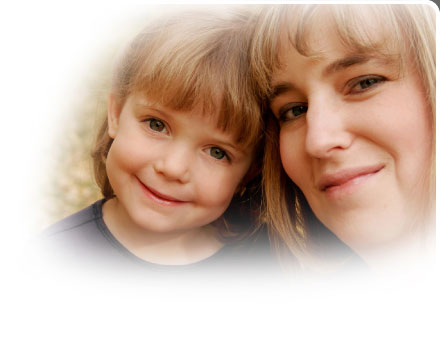|
|
|
Bicycles=Freedom
For Pinellas County's homeless, bikes are the training wheels for a new life.
By Alex Pickett, Creative Loafing
 CLEARWATER, FL, May 28, 2008—It's a rainy afternoon when I visit William Shumate at the St. Petersburg Free Clinic. It's a crappy day to go bicycling, but an even worse day to be out walking. CLEARWATER, FL, May 28, 2008—It's a rainy afternoon when I visit William Shumate at the St. Petersburg Free Clinic. It's a crappy day to go bicycling, but an even worse day to be out walking.
That's why Mad Dog, a homeless man who frequents downtown, has arrived at the Free Clinic to drop off his bicycle. The brakes are shot, he explains to Shumate, and he has an appointment later in the day.
Shumate, better known as "Pops" to St. Pete's homeless citizens, takes the purple 12-speed and heads up to his makeshift bike shop on the Free Clinic's third floor. It's a large loft-like space full of old wheelchairs, walkers and bicycles in various states of disrepair.
"If I get parts for all these, I'd be a happy man," says Shumate, adjusting his baseball cap with greasy, calloused hands.
 For the last three years, Shumate has been something of a freelance bike mechanic for St. Pete's homeless. He began in Williams Park with just a pair of channel locks, vice grips and a No. 10 wrench, repairing bikes for free or a pack of cigarettes. Two months ago, a city official who had witnessed Shumate fixing bikes on the steps of City Hall suggested he find a more permanent space. She brought him to the Free Clinic on Eighth Avenue North near MLK, where Executive Director Janet Egbert offered him the unused third-floor loft. For the last three years, Shumate has been something of a freelance bike mechanic for St. Pete's homeless. He began in Williams Park with just a pair of channel locks, vice grips and a No. 10 wrench, repairing bikes for free or a pack of cigarettes. Two months ago, a city official who had witnessed Shumate fixing bikes on the steps of City Hall suggested he find a more permanent space. She brought him to the Free Clinic on Eighth Avenue North near MLK, where Executive Director Janet Egbert offered him the unused third-floor loft.
Shumate jumped at the opportunity. Though he still works for free, Shumate, who used to operate a for-profit bike shop out of his Gulfport garage in the '80s, is happy to help even more of the homeless population.
To the average person, bicycles may seem like a luxury. But to the homeless, bikes are as important as bedrolls. Maybe more so. (And not just for escaping tent-slashing cops.)
May is Bike Month, and homeless advocates want the public to know bicycles are not a want, but a need. In the last six months, two Pinellas County programs have been created to address this need.
"A lot of folks that come to us have no transportation at all," says Victor Ulmer of the Homeless Emergency Project's new Freewheel program in Clearwater. "I mean nothing."
Shumate knows this first hand; the Vietnam vet is homeless himself, sleeping most nights on the streets.
"The importance of these bikes is not just for their comfort," Shumate says. "It's the ability to get from one point to another. Ninety-five percent of [homeless people] can't pay taxi fare, can't pay bus fare, can't pay diddly."
For the homeless, bicycles are crucial for jobs, doctor appointments and relationships.
"I got one guy who goes all the way to St. Pete Beach to see his girlfriend," he says. "I got another guy who rides to Clearwater to see his mother. He does that three times a week."
Since moving into the Free Clinic space, Shumate has repaired and given away 61 bicycles, many of which were found on the street; in addition, he's given another 17 to the Free Clinic to give out to clients when he's away. (He always checks with the police first to make sure the bikes aren't stolen property.) He keeps a list so people can't double-dip. And those who have a job move to the front of the list.
Shumate is silent as he fastens on a new set of brakes. He tests it and takes the bike down to a waiting Mad Dog, who nods his appreciation. Shumate takes out a cigarette and turns the corner. Sitting in the shade of a building is a despondent man with a dark blue 21-speed. "Hey, Pops," the man calls out. "What's wrong with this?"
Shumate kneels down by the bike and gets to work.
In Clearwater, the Homeless Emergency Project's Freewheel program has taken Shumate's work to the next level. The nonprofit bike repair shop and distribution program for homeless adults and children has been in operation since December.
Overseeing the operation is Victor Ulmer, 42, a former bike salesman. On a recent rainy day, Ulmer is helping Chris Sanderson turn his 25-year-old blue Shogun bike into a fixed single-speed. The main workshop, located in a collection of garages near one of HEP's transitional housing apartments off Betty Lane, is crowded with boxes of wheels, pedals hanging from hooks in the wall and buckets of handlebars.
"Not having transportation is depressing," Ulmer explains. "People think, 'I would go to work if I could, but I have no way to get there. I'll just stay here today.'"
But after a bike, he says, "That liberation opens people's minds, opens people's lives and it gets people back on track."
Currently, Freewheel only serves HEP clients, who upon proving need, are given a voucher for a free bicycle, bike lock, night lights and helmet.
The bicycles come from the Clearwater Police Department, Suncoast Bike Club and retail shops like Chainwheel Bikes and Clearwater Bikes. They've given away 50 bikes a month since January.
One of those bicycles went to Sanderson. A 58-year-old Vietnam vet, he was homeless before a veterans' hospital recommended him to HEP. He's since moved from the shelter to transitional housing. After Freewheel opened, Sanderson offered to volunteer.
"Chris helped me discover that the job I have here is more than just providing bikes to people who need them," Ulmer says while showing me another room with rows of Schwinns, Centurions and Huffys. "There's more help here than I thought I'd originally be providing."
As we talk, two visitors enter the shop, looking for bikes. Ulmer greets them like old friends
"For a noble machine as a bicycle, there is a lot more than getting from point A to point B," he says. "It's empowering."
Article reprinted with permission from Creative Loafing.
« back to features
|
|





